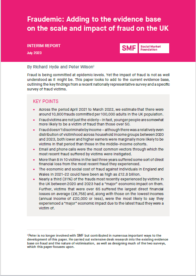Fraud is being committed at epidemic levels. Yet the impact of fraud is not as well understood as it might be. This interim report looks to add to the current evidence base, outlining the key findings from a recent nationally representative survey and a specific survey of fraud victims.
Key points
- Across the period April 2021 to March 2022, we estimate that there were around 10,800 frauds committed per 100,000 adults in the UK population.
- Fraud victims are not just the elderly – in fact, younger people are somewhat more likely to be a victim of fraud than those over 50.
- Fraud doesn’t discriminate by income – both lower and higher earners were marginally more likely to be victims in that period than those in the middle‑income cohorts.
- Email and phone calls were the most common methods through which the most recent fraud suffered by victims were committed.
- More than 8 in 10 victims in the last three years suffered some sort of direct financial loss from the most recent fraud they experienced.
- The economic and social cost of fraud against individuals in England and Wales in 2021-22 could have been as high as £12.8 billion.
- Nearly a third (31%) of the frauds most recently experienced by victims in the UK between 2020 and 2023 had a “major” economic impact on them. Further, victims that were over 65 suffered the largest direct financial losses on average (£6,758) and, along with those on the lowest incomes (annual income of £20,000 or less), were the most likely to say they experienced a “major” economic impact due to the latest fraud they were a victim of.
- Around 7 in 10 victims reported other negative consequences from fraud they experienced, including lower self-confidence, mental health issues and financial disruption.
- People are most likely to report fraud to their bank or building society (56%). A large minority of victims report fraud to the police (31%).
The final report, featuring insights from interviews with victims and a SMF‑convened, policy‑focused expert roundtable on fraud, will be published in the autumn. It will also present recommendations for improvements to the current counter-fraud policy landscape.


